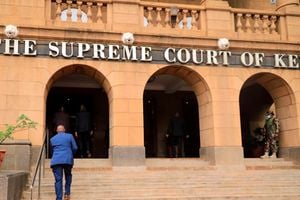
President William Ruto and First Lady Rachel Ruto are received at the Great Hall of the People during a State banquet hosted by President Xi Jinping for visiting Heads of State and government in Beijing, China, on October 17, 2023.
The date was August 9, 1965. A Prime Minister publicly cries in a press conference. His name is Lee Kuan Yew, Prime Minister of a new country called Singapore with a population of about two million people that has just been carved out of a bigger country called Malaysia — or rather he mourned its ejection from a federation of that larger country called Malaysia.
" For me it's a moment of anguish because all of my adult life. I had believed in the merger and the unity of these two territories. Its people connected by geography, economics and ties of kinship, " he said.
Then he added to his Singaporean audience: "Be firm. Be calm. We are going to have a multi-racial nation in Singapore. Everybody will have his place. Equal.Language. Culture. Religion ".
Some few years earlier, Singapore had emerged from colonialism as an independent state comprising mainly ethnic Chinese (75 per cent) and minority Malays. Lee had mobilised his people in a referendum to agree to form a single state with neighbouring Malaysia as a hedge against expansion of communism. He feared China communistic contagion, whose ties of kinship was attractive to most ethnic Chinese in Singapore. But that union dissolved shortly thereafter after numerous disagreements.
On regaining independence in 1965, Lee had to make a strategic geopolitical choice. Should Singapore lean Communistic (that was the natural pull as most ethnic Chinese favoured that) or West capitalistic pivot?
He chose the latter. And he succeeded wildly growing his country economically many times more than both his native China or Malaysia that had divorced Singapore in 1965.
Geopolitics basically means relationships between countries and strategic choices national leaders make to hinder or foster international relations within the context of a geographical and economic sphere.
Whereas ordinary citizens might not consider geopolitics as being very important to their ordinary lives, these choices matter a lot. The ordinary citizens often evaluate their leaders in terms of delivery of basics like health and education services but geopolitical choices can harm or advance a nation wellbeing for many generations.
Let us take several examples.
South and North Korea in the 1950s were partitioned in controversial circumstances. Seventy years after that partition, everyone can now see which country made the best geopolitical choice if current economic standards are anything to go by. Of course South Korea, whose leaders of 1950s had better foresight.
China and Taiwan (both comprising largely Chinese people) in the 1950s made similar geopolitical choices. In fact, both countries as at that time were vying to use the name China. China veered East whereas Taiwan, like Japan, veered West as ideological Cold War blew in that decade. China’s economic standards fell until the 1980s when it changed course.
Like Japan, Taiwan prospered, having made the correct geopolitical choice of leaning West.
Some geopolitical choices are circumstances of history beyond the control of national leaders.
A good example is Germany which after World War 2 was partitioned by the winning powers, USSR and USA, into two: East and West Germany. West Germany prospered, having fallen into the West bloc while East Germany stagnated having fallen into Soviet bloc. In 1990 the two got reunited.
UK recently made the geopolitical decision to leave European Union. History will tell if indeed that was a beneficial choice or not. Presently, countries are caught in the subtle struggle between the West and China. What is the best geopolitical choice for Kenya? Let's first look at Kenya geopolitics historically.
In the 1970s, Kenya and Tanzania were caught up in geopolitical struggles between East and West.
Tanzania went East and probably its current economic standard (which lags behind Kenya) can be traced to this choice.
But the current geopolitical choices are more complicated and nuanced. China and USA are both capitalistic advanced countries but mainly differ in forms of governance (US being democratic and China leans towards autocracy).
Therefore, the geopolitical choice is caught up in some deep dilemma.
On the one hand, the abovementioned examples seems to illustrate countries that align with the West capitalistic states do well and therefore aligning with US suits Kenya's interests.
On the other hand China offers opportunities no country of our standard would want to miss — cheap credit, a good market for export and import purposes, cheap technologies and expertise are some things to note. Chinese growth is an inspiration to many African societies.
Well, Kenya can opt the enlightened foreign policy of Turkey’s Recep Tayyip Edrogan immediately when he got power about 20 years ago.
He then adopted a "zero problem" policy that was intended to appease all key regional combatants notwithstanding their differences. That's a pragmatic stance which if adopted, Kenya can befriend all nations in the world and we only map our interests in a cold and strategic manner.
We thus embrace China and USA and harness that which is best for our national interests.
- Dr Kangata is the Governor Murang’a County ; Email: [email protected]












